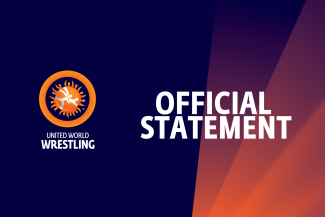Executive Board Develops Plan for Remaining 2020 Events
Friday, July 3, 2020 - 14:51 By United World Wrestling Press

CORSIER-SUR-VEVEY, Switzerland (July 3) -- Following the decision to cancel and postpone international wrestling competition until August 31, the Executive Board of United World Wrestling recently convened to develop an action plan for the remaining events in 2020.
This plan includes conditions and criteria which would allow events to be delivered if they ensure the health and safety of the athletes and any additional participants. Competitions must provide general sanitary conditions, the ability to travel to/from the nation, and robust countermeasures to COVID-19 impacts on competition must be enforced.
The specific countermeasures are still being reviewed by various UWW commissions and experts with the intent to provide the safest possible competition conditions.
UWW will also work together and maintain dialogue with the World Health Organization (WHO) and International Olympic Committee (IOC) Medical department to remain up to date on these critical details.
Any competition wishing to be held in 2020 must follow the criteria as established by the Executive Board and must be fulfilled for any competitions to go ahead. The competitions must include 8 of the 10 best ranked teams and a minimum of 70% participating countries (based on prior year’s athlete attendance).
To be valid, the conditions and criteria for competition must be confirmed by UWW and local organizers two months prior to the start of the competition. If the criteria is met, the best-case scenario would allow for the following competitions to take place on these dates:
- Cadet European Championships – City to be confirmed, POL - 05-11.10.2020
- Junior European Championships – Skopje, MKD 19-25.10.2020
- U23 World Championships – Tampere, FIN, 23-29.11.2020
To help reduce risk and control the safety of the events the Executive Board also chose to postpone the Junior World Championships until December and combine the Junior and Senior World Championships with the same organizer. Belgrade will be the host for both competitions.
- Junior World Championships – Belgrade, SRB, 04-10.12.2020
- Senior World Championships – Belgrade, SRB 12-20.12.2020
Continental Championships will be reviewed by each Continental Council and the feasibility of each competition will be determined, taking into consideration the status of the pandemic within each region.
The Board also decided if the conditions do not allow for Junior World Championships then Continental Championships may be considered in its place. For example, if conditions do not permit for U-23 World Championships, U-23 European Championships may be organized during those dates.
The Executive Board will reconvene in August and keep the wrestling community up to date with any new decision in accordance with updated information on the pandemic, as well as update the competition programme and competition delivery criteria.
“United World Wrestling has the utmost respect and thank all organizers for their dedication and commitment to delivering competitions during these unprecedented times,” said United World Wrestling president Nenad Lalovic.
“We would like to thank the entire wrestling community for their support and flexibility in adapting to the conditions that are changing daily. Together we will achieve success on and off the mat.”


Share your thoughts.
Comments